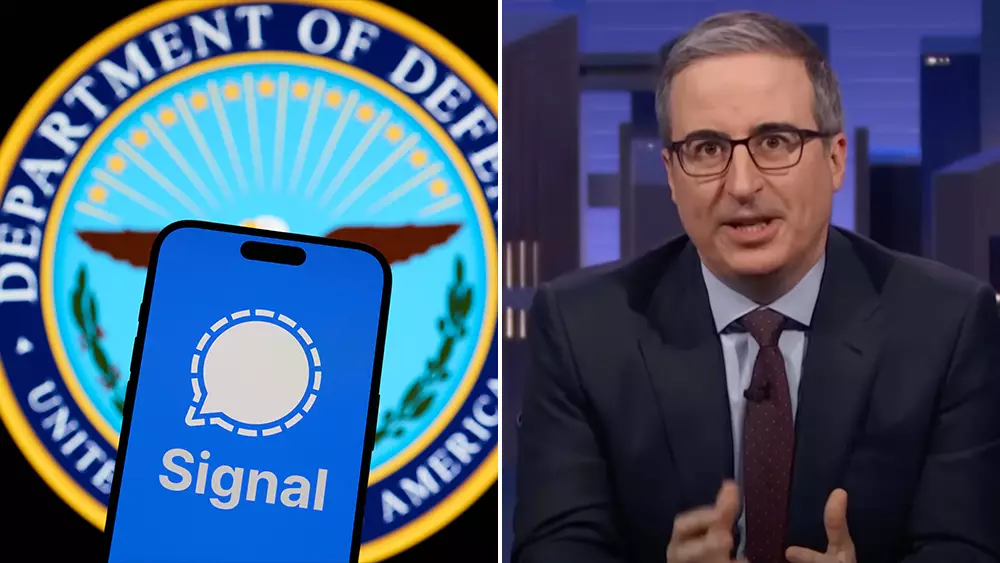In a world where serious matters demand seriousness, political leaders often disappoint. John Oliver’s critique of the Trump administration exemplifies not only a prevailing sentiment in media but also serves as a reflection of our political environment. The recent leak of a Signal group chat—fondly dubbed “Houthi PC Small Group”—is an embodiment of this incompetence; it allowed us a peek into an administration that often appeared more preoccupied with emojis than effective governance. With the headline, “The Trump Administration Accidentally Texted Me Its War Plans,” The Atlantic provided an unsettling account that forces us to confront a disturbing question: how can we trust leaders who lack both self-awareness and seriousness in their roles?
Oliver’s humor, laced with biting commentary, puts forth a core issue—our leaders appear to be indulging in childish antics when the stakes are high. The use of emojis such as the fist, American flag, muscle, flame, and prayer hands following serious military actions is not just ludicrous; it indicates a wider detachment from the grim realities their decisions inflict. To frame military aggression with a relatable, humorous spin brings to mind an unsettling image: it’s akin to discussing a tragedy while making light-hearted jokes. This dissonance doesn’t just minimize the severity of the issues; it trivializes them, amplifying an overarching culture of disengagement amongst political leaders.
Deportations and Cruelty: A Disturbing Trend
At the heart of the administration’s malfeasance lies a darker narrative—the deportation of vulnerable populations. In Oliver’s discourse, he exposes a harrowing reality: the deportation of Venezuelan migrants under the pretext of crime association often lacks due diligence, leaving many innocent individuals at the mercy of a political system designed to safeguard only a select few. The flimsiness of reasoning, such as tattoos being construed as affiliation with criminal gangs, showcases an alarming trend towards cruelty masquerading as security.
This not only highlights incompetence; it illustrates a severe ethical lapse as well. The deportation of individuals with faulty documentation raises questions about human rights and the integrity of our legal frameworks. The visual of returning these asylum seekers to El Salvador’s brutal prison systems like Cecot draws a chilling parallel to historical atrocities, particularly when paired with the imagery of caged prisoners. Oliver’s commentary poignantly frames this grotesque decision-making, calling attention to an administration that appears to be hyper-focused on optics while considerably underestimating the weight of their choices.
The Absurdity of Control Through Fear
The methods of control often adopted by the administration echo themes of absurdity dressed up as statecraft. By curating images and narratives that evoke fear, the leaders pivot to a political strategy that leverages intimidation over empathy. The intentional use of menacing visuals is not simply a design choice; it’s part of a larger discourse that seeks to redefine how we view national security and human rights. What we observe is a political strategy that abstracts human lives, reducing complex stories into symbols of crime and danger, thereby creating convenient scapegoats in the process.
John Oliver’s references to “Nazi-adjacent visuals” illuminate a crucial point. The imagery presented by governmental figures can incite walls of fear and hatred instead of bridges to understanding and compassion. The portrayal of detainees in harrowing situations crystallizes a troubling narrative where empathy is replaced by political expedience. It reflects a broader existential threat to our collective humanity, robbing us of the space to engage with one another thoughtfully.
Resistance and the Path Forward
Yet, amidst the darkness shines a glimmer of resistance. As Oliver notes, pushback against these policies has begun, signaling that the public is similarly fed up with the cavalier attitude of their leaders. Grassroots movements and increased civic engagement are crucial in shifting the narrative and demanding accountability. The fact that the administration faces moral outrage implies that the populace has not entirely succumbed to apathy.
However, replacing incompetence with compassion requires unwavering commitment and collective action. As citizens, it’s our responsibility to navigate these turbulent waters while demanding that our leaders adhere to a higher standard of accountability. We must compel them to recognize that their decisions have weight and consequences, which are far beyond what can be expressed through amusing emojis and grotesque optics. By pushing for a society governed by serious people, we can foster an environment where policies reflect our shared values and humanity, not mere caricatures of leadership.

